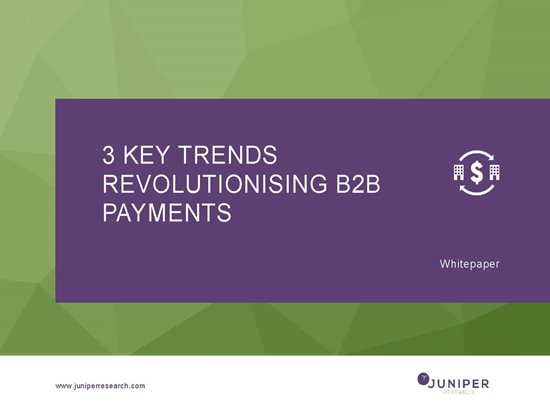The impact of COVID-19 has accelerated disruption in the B2B payments marketplace and according to a new study from Juniper Research, it will be two years before business recovers its losses.

The research shows how deep the disruption to business has been around the world from the coronavirus pandemic, estimating that cross-border B2B payments will reach $35 trillion in 2022 from a COVID-related low of $27 trillion in 2020, growth of 30%.
A resurgence of the pandemic also raises the risk that business recovery may be even slower than anticipated although researchers are optimistic.
Automation is making efficient transactions possible
While traditional payments by check, bank transfers, and wire services still dominate, Juniper highlights three trends in B2B payments to keep an eye on. Traditional banks and payment providers need to take a close look at these trends to remain competitive.

The first big impact is automation. The research shows automation will be crucial in fixing the challenges faced by businesses in their payment processes. This automation must be enabled using open APIs, which can radically simplify sharing data between competing systems.
Automation brings tremendous benefits to business including electronic invoice capture and invoice automation; simpler, faster invoice approvals; integration with familiar accounting software; and improved cashflow management.
“Fintech vendors have risen to prominence by offering both greater efficiency and ease of use, calling into question the fundamental approach that banks take. Banks must turn to APIs for greater automation, as well as more competitive pricing, to retain some influence in this highly lucrative market,” said report author Nick Maynard.
Blockchain technology is moving mainstream
Blockchain is reducing the complexity in cross-border and B2B payments.

Clearing firms involved in cross-border and B2B payments today mostly use independent processing systems and the lack of standardization between clearing bodies and correspondent banks causes delays in settling payments and increases the cost of transactions.
Two vendors leading the implementation of blockchain solutions are Visa and Ripple, with Visa B2B Connect and RippleNet. RippleNet uses its XRP cryptocurrency, giving financial institutions a single API connection to RippleNet and access to pay-out in over 40 currencies with on-demand liquidity and consistency through a common rulebook.
Increased speed leading to instant payments
Instant or real-time payments have the potential to dramatically reduce costs from the higher transaction fees of credit card networks.

While the EU and other markets are pressing ahead with improvements to the speed of payments, the US is lagging. The US FedWire service originally scheduled to enter Phase 1 in November 2020 is now delayed and the proposed 2023 full implementation is now a question mark.
The Clearing House launched RTP instant payments for personal and business customers in 2017 and RTP participants already include Bank of America, Citibank, and Cross River.
The Federal Reserve plans to provide competition with its proposed FedNow service but by the time it launches in 2023/24, if it launches then, it will already be years behind the EU’s SEPA Instant Credit system and other global competitors.
What’s ahead post-pandemic?
According to Juniper Research, challenger service providers will handle 38 billion transactions in 2020 and grow 42% to reach 53 billion transactions by 2022. Fintech vendors will account for 12.6% of B2B payments by volume in 2022.
Despite the slow recovery elsewhere in the economy due to the pandemic, non-bank B2B payments will exceed 2019 volumes in 2021, showing how the migration from offline to online, and the need for greater efficiency, is helping non-traditional vendors compete.

“Instant payments, services where funds settle in 10 seconds or less, will account for 9.3% of B2B transactions by volume in 2022, up from 6% in 2020. However, instant payments will only account for 6.3% of B2B transactions by value in the same year, illustrating the predominantly low value of these payments, due to low transaction limits for schemes,” according to Juniper’s whitepaper.
Traditional providers also need to implement blockchain technology and other innovations in order to retain, let alone grow their market share.
The demand by business for greater transparency, near-instant payments, lower fees, and increased security for B2B payments means traditional banks and financial service providers will have to hustle or be left in the dust by faster-moving fintechs.
You can download a copy of the research whitepaper 3 Key Trends Revolutionizing B2B Payments here.








LET’S CONNECT